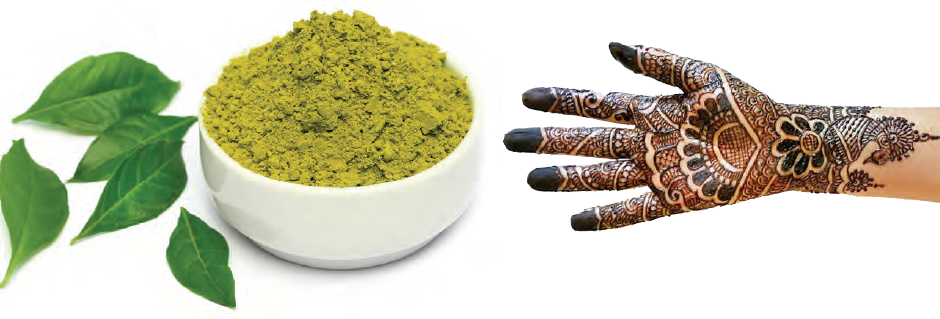Henna: A Miracle Plant
India & You
September-October 2016

Henna, a natural and organic product, is quintessentially used in India, mainly for skin and hair. It also adds a cultural and medicinal value to the country that has been using it for centuries now.
Henna is versatile. I have been using it all my life for dyeing purposes and curing many health problems. Also, it has always been an essential part of every special occasion, especially weddings,” says Kiran Kumar, 74, a retired employee of a government concern.
Mehndi, as it is known in Hindi, is among the many diverse plants indigenous to Asia that are known for their health and cosmetic benefits.
Henna is being used in India since the Bronze Age. As the plant is considered lucky and believed to bring joy, women of that time applied henna when they went to meet their spouses and celebrate victory over enemies after wars. Not confined to its auspicious importance, henna is also an important part of Ayurveda and Unani medicines and offers various beauty benefits.
Let it heal you
Various parts of henna plant have been historically used in India for medicinal purposes. Henna flowers are therapeutic and great pain relievers. Just crush a handful of them to make a paste and add vinegar before applying it on your forehead for an instant relief from headache.
Not only the flowers but oil obtained from henna has also proven to be useful for curing stomach pains, open wounds, jaundice and prevent hair loss. As the plant exhibits antibacterial and antifungal qualities, it is an effective Ayurvedic healer and can be beneficial for people with arthritis, liver disorders and infections.
As green and long henna leaves serve as a cooling agent, they can be used fresh or in a powdered form to treat prickly heat. Just grind some leaves with water and apply over the affected area to soothe the body. In case of sore throat, a decoction of the leaves can also be used to gargle for instant relief.
Henna also offers an ideal way to treat dandruff. Boil a bunch of henna leaves till the water turns yellowish-brown and then allow it to cool before rinsing the hair with it. Apply this regularly to prevent it from coming back.
According to Ayurveda, henna has been an important part of traditional remedies that date back centuries. Women have also historically used henna seeds to regulate menstruation and also to treat infectious diarrhoea. Just mix the powdered seeds with ghee (clarified butter), shape them into small balls and take with water.
“Adding a bit of henna oil and leaves to your herbal regimen will get you into a regular sleep schedule by soothing the body and mind,” says Shalini Sharma, 39, resident of northwest Delhi, who often massages her scalp with henna oil to relax her mind.
Look good, the herbal way
Along with medicinal properties, the herb also offers beauty benefits. It has ideal purifying powers and is also antibacterial. For healthy hair growth, boil some henna leaves in mustard oil to massage the scalp, leave it for 1-2 hours and rinse clean. It relaxes the mind and also prevents hair fall. Henna leaves are nourishing and also offers an herbal way of dying hair. All you have to do is add water to the henna powder/crushed henna leaves and make a paste. It then has to be applied on the hair and be left for 2-3 hours before washing. You can also add olive oil or yogurt for conditioning dry hair.
For clearer skin, apply a very little amount of henna oil on the skin and wash after 15-25 minutes. Ayurveda suggests that henna oil can effectively treat eczema, scabies, fungal infections and burns.
Henna has also been used in cosmetics, as a dye for fabrics, nails and hands for ages. Dry henna powder is mixed with water, lemon juice, tea or other ingredients, depending upon the tradition. The paste is then applied with a plastic cone to adorn the bride’s body with beautiful temporary designs as it is believed to bring good luck and happiness. Not only in India, but the tradition is also followed in other Asian nations on weddings, births, various festivals or special occasions.
This henna art is turning into a contemporary art form. It is used to test an actual inked tattoo or just as a temporary form of expression. This traditional and cultural influence of henna designs has become quite popular in the west as well and can be seen on women’s hands, arms and feet.
However, some hair dyes that claim to be henna-based may contain other chemicals which a sensitive skin may reject with side-effects. Though it is generally safe and non-toxic, to some it may cause allergies, skin rashes or internal discomfort. Thus, henna must only be used under the guidance of a medical practitioner or an herbalist.









